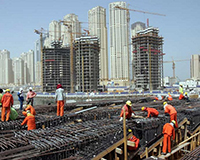 The construction industry could add $1.6tn in value worldwide if it boosts stagnating levels of productivity, according to McKinsey Global Institute’s Reinventing Construction: A Route to Higher Productivity report.
The construction industry could add $1.6tn in value worldwide if it boosts stagnating levels of productivity, according to McKinsey Global Institute’s Reinventing Construction: A Route to Higher Productivity report.
The $10tn a year industry has had a 1% rise in labour productivity over the past two decades, underperforming the wider economy, where productivity has risen 2.8%.
Larger contractors working in heavy construction, including civil and industrial work, tend to have 20% to 40% higher productivity than smaller or specialised ones.
MGI said that among the main reasons for lower performance levels were extensive regulation in the industry and an underinvestment in technology.
Embracing new technology and materials could raise productivity by 14-15%. This would include 3D building information modelling using unmanned drones for scanning, monitoring and mapping construction.
Better use of data could also improve the accuracy of cost and schedule estimates along with engineering productivity.
The report also said recent experiments in modular housing showed that mass production could give a tenfold boost to productivity.
For example, Barcelona Housing Systems said it could build between five and 10 times as many buildings as traditional construction with a modular housing system it plans to have in place by 2018.
In China, Broad Sustainable Buildings has said its buildings, which include a 30-storey hotel built in 15 days, cost 10-30% less than ones using traditional methods.
MGI also called for greater transparency, reducing corruption and investing more in training for an ageing workforce that is facing a skills shortage.
Causes for low productivity
• Increasing project and site complexities
• Extensive regulation, land fragmentation and the cyclical nature of public investment
• Informality and potential for corruption distort the market
• Construction is opaque and highly fragmented
• Contractual structures and incentives are misaligned
• Bespoke or suboptimal owner requirements
• Design processes and investment are inadequate
• Poor project managemenet and execution basics
• Insufficiently skilled labour at frontline and supervisory levels
• Industry underinvestment in digitisation, innovation and capital
• To send feedback, e-mail karl.tomusk@estatesgazette.com or tweet @ktomusk or @estatesgazette










